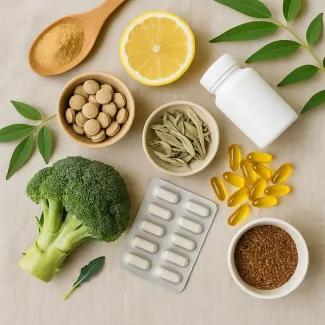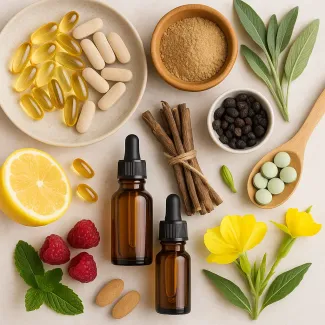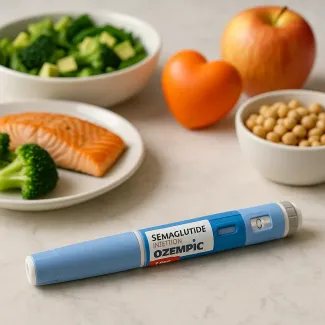
When intimacy feels quieter after 30
Understanding subtle shifts in desire without pressure or alarm
For many people, intimacy in their 20s felt spontaneous and almost effortless. After 30, things can feel different — not dramatically “wrong,” just less automatic. Desire may take longer to appear, sensitivity can fluctuate, or closeness feels more connected to mood and energy than before. A common but quiet misconception is that this change means something is broken. In reality, it often reflects normal physiological shifts in how the body responds to stress, stimulation, and recovery as the years add up.
The primary physiological axis: the nervous system and stress load
Intimacy is deeply connected to the nervous system, particularly the balance between alertness and relaxation. In your 30s, 40s, and beyond, daily life often becomes more layered — work pressure, mental load, disrupted sleep, and constant stimulation. Even when life is going well, the nervous system may spend more time in a “high-alert” state, leaving less room for softness, presence, and desire.
Ginkgo biloba is often discussed in this context because it is traditionally associated with circulatory support and neural signaling. Rather than acting as a stimulant, it is more often viewed as something that may help the body maintain smooth communication between brain, nerves, and peripheral tissues, especially when stress and mental fatigue are part of everyday life.
How age-related changes show up in everyday intimacy
These shifts rarely appear as a single, clear symptom. More often, they show up as small patterns:
- Feeling mentally interested in intimacy but physically slower to respond
- Needing more emotional safety or calm to feel desire
- Noticing that fatigue or poor sleep quickly dampens sensitivity
These experiences are closely tied to stress regulation, mental clarity, and overall energy levels. When the brain is overloaded, intimacy becomes another task instead of a natural expression of connection. This is why broader lifestyle foundations — sleep quality, stress recovery, and mental focus — matter so much in this phase of life. Topics like daily stress balance and cognitive energy are explored in depth in Ashwagandha Benefits for Stress, Sleep & Energy in Your 30s, which looks at how calming the nervous system can influence overall well-being.
Circulation, awareness, and subtle responsiveness
Another factor often discussed alongside ginkgo biloba is circulation, particularly microcirculation. As the body ages, blood flow efficiency can change slightly, especially under stress or sedentary routines. Good circulation supports tissue awareness and sensitivity, which are important for physical intimacy but also for general bodily comfort.
This doesn’t mean chasing stronger sensations. Instead, it’s about supporting the conditions that allow the body to notice and respond naturally. Mental sharpness and body awareness often go hand in hand here. If you’re interested in how brain health and focus evolve after 30, Brain-Boosting Habits in Your 30s: How to Sharpen Memory & Mental Energy offers a broader view on maintaining clarity and responsiveness as life gets busier.
The role of fatigue and recovery
Persistent, low-grade fatigue is one of the most underestimated influences on intimacy. You may be sleeping enough hours, yet still feel not fully restored. When recovery is incomplete, the body prioritizes essentials and subtly downshifts non-urgent systems, including sexual responsiveness.
This is why desire often returns during vacations, slower weekends, or periods of emotional ease. Supporting daily energy — not forcing performance — is key. A wider look at restoring vitality can be found in Beat Fatigue Naturally: Strengthen Immunity and Boost Your Daily Energy, which connects energy regulation with overall physical resilience.
What a balanced, realistic approach looks like
A gentle, lifestyle-oriented perspective avoids extremes. Rather than “fixing” intimacy, the goal is to create conditions where it can re-emerge:
- Prioritizing consistent sleep rhythms
- Reducing chronic mental overload
- Allowing more time for transitions from stress to rest
- Supporting emotional steadiness and self-regulation
Emotional resilience plays a quiet but powerful role here. When emotional bandwidth is low, desire often follows. Strengthening this inner stability is explored further in Building Emotional Resilience in a Fast-Paced World: Proven Strategies, highlighting how calm adaptability supports many aspects of adult well-being, including intimacy.
A calm perspective on ginkgo biloba and intimacy
Ginkgo biloba is best understood not as a solution, but as part of a broader conversation about nervous system balance, circulation, and mental presence. In phases of life where desire feels different rather than absent, this calmer framing matters. Intimacy after 30 is less about intensity and more about connection, awareness, and timing — qualities that grow when the body feels supported rather than pushed.
Seen this way, changes in desire are not a loss, but a signal to adjust pace, priorities, and self-care — with patience, realism, and respect for how the body evolves over time.





